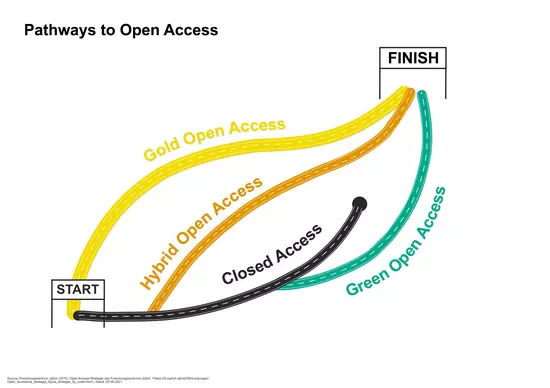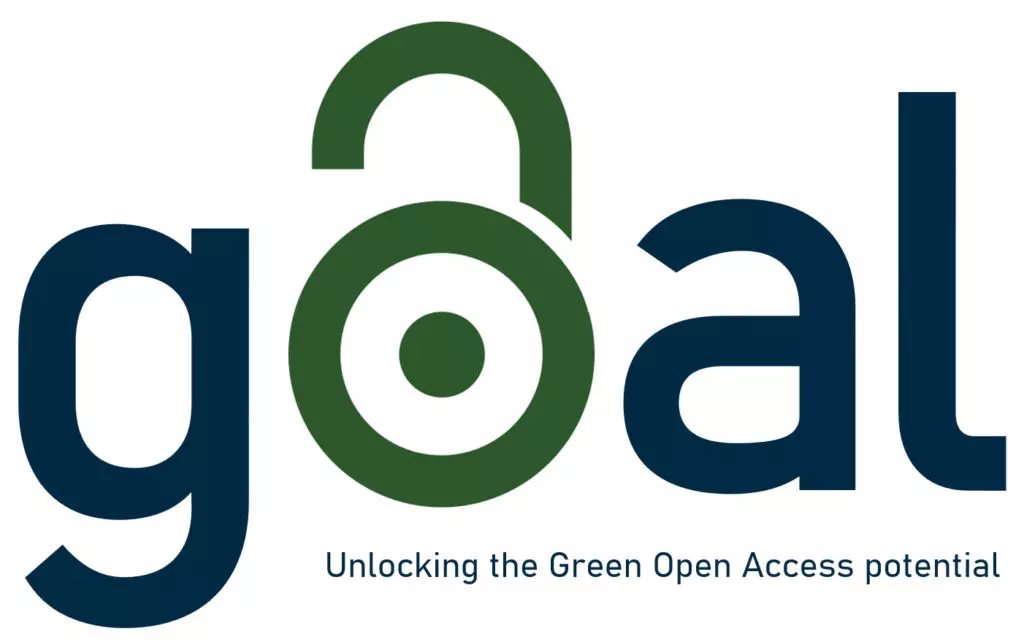Publishing and Open Access
Achieve maximum reach with an Open Access publication: Regardless of whether you are a researcher or practitioner. Benefit from our Open Access services and funding opportunities.
What is Open Access (OA)?
Open Access publications guarantee unrestricted and free access to scientific information for everyone, anywhere, for subsequent use. There are basically two OA models, the "Green Road" and the "Gold Road".
Green Road
"Green Road" means publishing on professional or institutional document servers (repositories). Works that have already been published or are due for conventional publication are published in parallel on these. This is permitted by a large number of scientific publishers. However, all authors must clarify this in advance with the first publisher.
Gold Road
In the case of the "Gold Road", the publication is published in a pure OA journal or book. Like conventional journals, OA journals are published by scientific publishers and are subject to a peer review process. The same applies to OA books.
The difference is in the financing: Conventional publishers sell their content for readers to pay for, while in the OA model the authors and/or the institutions they are affiliated to are charged. This means that the publications are freely available to everyone.
Caveat: Hybrid Open Access
Hybrid Open Access means that authors “buy” their own articles or book contributions in a paid publication with an often high publication fee so that everyone can access them. The rest of the publication remains locked. In this way, access to scientific information is paid twice (further necessary subscriptions and extra publication fees). This model is therefore very controversial.
The exception here are so-called Read and Publish agreements with publishers. This means that universities continue to have access to a publisher's range of journals and at the same time have the option of publishing Open Access in it free of charge.
Detailed Information
Course on Open Access publishing at the ZHAW (in German - ZHAW login required)
Information platform open-access.net
Virtual Open Access Assistant Papago as initial information for funding opportunities, rights and obligations regarding Open Access for your publication.
Open Access policies and funding
ZHAW Open Access Policy
In 2015, the ZHAW Executive Board adopted an OA policy. In this policy, the ZHAW commits to making its research findings intended for publication freely accessible to the public according to the principles of Open Access. ZHAW members are encouraged to publish a version of their publications in the institutional repository ZHAW digitalcollection. Primary OA publications are endorsed by the ZHAW and supported through measures by the University Library.
Additional Open Access mandates and funding
All major research promoters require and/or promote the publishing of documents according to OA principles.
Swiss National Science Foundation (SNSF)
European research funding
Open Access publishing
The University Library provides advice for selecting the appropriate Open Access option for your publication project and offers financial support for Open Access publications.
How and where to publish in a green Open Access journal?
Secondary publication is permitted by a large number of scientific publishers under certain conditions. The basis for any upload of documents is the legal clarification with the publisher. Corresponding conditions can be researched in the SHERPA/RoMEO database.
ZHAW employees can use the institutional repository ZHAW digitalcollection for secondary publications. The associated Wiki (in German) offers comprehensive assistance for the entire publication process.
How and where to publish in a gold Open Access journal?
Basically, gold OA publication platforms have the same requirements, such as reliability and evaluation in a discipline-specific database as conventional journals and publishers. We can advise you on the selection.
The University Library supports ZHAW researchers with funding for gold OA publishing through a publication fund. Nowadays, there are also many renowned specialised journals or book publishers that do not charge publishing fees. In order to receive financial support for publishing, the submitted publication must comply with the ZHAW Guidelines on funding open access publications.
How and where can I benefit from Read and Publish agreements?
The Consortium of Swiss Academic Libraries negotiates so-called Read and Publish agreements in accordance with the national OA strategy.
The University Library provides financial support to ZHAW researchers to publish in journals from these publishers within the framework of the Read and Publish agreements.
How am I supported as an editor?
Diamond Open Access refers to publications that can be read free of charge by all interested parties worldwide and for which the authors do not incur any costs. The ZHAW University Library provides advisory and financial support to editors who wish to transfer their journal or book series into a Diamond Open Access model.
Open Access searches
Search for freely accessible scientific full texts, so-called Open Access publications, in our ZHAW swisscovery search portal or on other platforms.
- BASE
- BASE is the key search engine for thousands of repositories worldwide. You can access full texts of the majority of indexed documents for free.
- DOAB
- The Directory of Open Access Books (DOAB), published by the OEPAN Foundation, is a freely accessible online catalogue of OA book publications with an academically recognised level of quality.
- DOAJ
- The Directory of Open Access Journals (DOAJ) is a directory of e-journals that are freely available on the internet in accordance with the principles of Open Access. It includes peer-reviewed academic journals that are available online for free to readers immediately upon publication. For some of the journals it is also possible to search for individual articles.
- Google Scholar
- Google Scholar is the largest search engine for academic resources. Here, you will find articles that are available as full text on a subscription basis as well as numerous OA resources.
- Open Access Helper
- Open Access Helper is a browser extension for Safari, Chrome and Firefox with which you can automatically search for freely available articles on websites. The browser extension is easy to use and configure. By integrating third-party services, it offers additional features, such as the option to search for similar articles.
- OSF Preprints
- The OSF Preprint Server is held by the Center for Open Science (COS), a nonprofit organization. The plattform aggregates search results from a variety of other preprint providers such like arXiv, PsyArXiv, SocArXiv and more.
The GOAL Project
The GOAL (Unlocking the Green Open Access potentiaL in scholarly and professional journals in Switzerland) project aims to promote the green road to Open Access to scholarly and application-oriented journals. These journals are particularly relevant to universities of applied sciences and universities of teacher education. However, they were not covered by existing Open Access funding measures so far.
The aim of the GOAL project is to negotiate and implement secondary publication policies with the editorial teams of application-oriented journals. In this way, publications in the most important journals could be made accessible in (institutional) repositories, such as ZHAW digitalcollection.
The GOAL project runs from January 2022 to December 2024 and is co-funded by swissuniversities. The university library of ZHAW Zurich University of Applied Sciences leads the project. Our partner institutions are Lucerne University of Applied Sciences and Arts (HSLU), University of Applied Sciences and Arts Northwestern Switzerland (FHNW), Zurich University of the Arts (ZHdK) and University of Teacher Education Fribourg (HEP | PH FR).
Further information can be found on the GOAL website.

